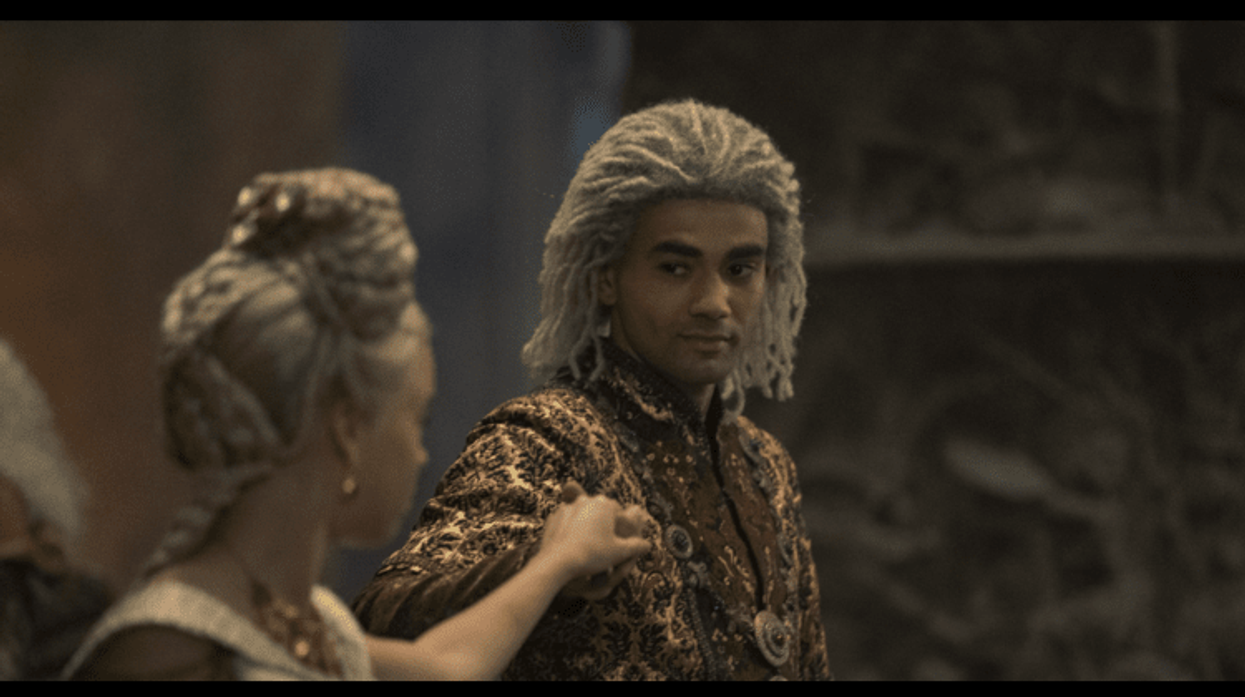Editor's note: This article contains spoilers for House of the Dragon Season 1, Episode 5.
As part of our new ritual, my boyfriend and I tuned in to watch House of the Dragon this past Sunday, along with about 29 million other viewers. We both let out a collective "aww" when, halfway through the episode, the show introduced its first queer storyline. In one scene, Princess Rhaenyra, played by Milly Alcock, discusses her soon-to-be marriage to her betrothed, her cousin, Laenor Velaryon, played by John Macmillan. In a seemingly modern agreement of sorts, Rhaenyra and Laenor decide they will have an open marriage. This gives the couple the freedom to explore their separate love interests. We know from previous episodes that Rhaenyra has been intimate with a knight of the King's Guard, Ser Criston Cole (Fabien Frankel), while we learn in the next scene in Episode 5, Laenor has a romantic relationship with his own knight, Ser Joffrey Lonmouth, played by Solly McLeod.
My boyfriend, Carlos, and I were ecstatic when we saw the show's first queer storyline introduced in a way that went beyond the subtle suggestions of Laenor's sexuality as we had watched in earlier scenes. In watching this scene, I realized how rare it is to see a relationship in a mainstream show like House of the Dragon that mirrors my own. Carlos and I looked at each other and smiled as Joffrey and Laenor shared a passionate kiss on a Westerosi beach. "We are lucky," I told him, "to live in a time when we finally get to see ourselves."
"It's pretty cool, huh?" Carlos replied before we shared a kiss of our own that mirrored that between the two young men on our TV.
Though the joy did not last long. We know from Game of Thrones that weddings in Westeros never end without bloodshed. A fight interrupts the celebration at Rhaenyra and Laenor's wedding, held in the Throne Room of the Red Keep. After Joffrey warns Criston that he knows Rhaenyra, Criston begins brutally attacking Joffrey in front of the wedding's attendees. It's not just that this fight takes the attention away from the wedding reception -- if you could even call it a fight. It's more like a ruthless beating the viewer is forced to watch. Several minutes after the show's first queer love story gets introduced, we see it quite literally crushed by Ser Criston's fist as he murders Joffrey in the Throne Room by smashing his head into the marble floor until he is unrecognizable in a spectacle of that famous HBO gore we've all become too familiar with.
"Was that really necessary?" I say aloud as I shield my eyes with my hand as Laenor, on-screen, sobs uncontrollably over his lover's limp, practically headless shell of a body.
"What the fuck was that?" Carlos seems to summarize it plainly for both of us. Just like that, we were instantaneously brought back to a reality where queer characters cannot fully exist without tragedy.
In 2016 the queer feminist site Autostraddle made a list of "225 Dead Lesbians and Bisexual Characters and How They Died" after the death of a lesbian character on the show The 100 made headlines. It's important to point out that this list does not feature gay and bi male characters, nor does it cover trans characters. It also doesn't include those LGBTQ+ deaths found on film.
House of the Dragon is the latest example of the tragic queer storyline. After Sunday's episode, I wondered what intention the show's creators had in introducing this romance to the audience before snatching it away from us no more than 20 minutes later with an unnecessarily graphic death. What good is queer representation if what's being portrayed goes against the interest of the queer viewer? At a moment when LGBTQ+ rights are under the microscope in the Supreme Court, with the Senate planning to hold a vote on marriage equality after the midterms, and hate crimes on the rise, just months after members of the Patriot Front, a white supremacist group, were arrested for planning an attack at an Idaho Pride festival, it is more than tone-deaf for the creators of House of the Dragon to represent violence against queers in this way; it is blatantly irresponsible.
Mey Rude published a list for Out this week of "15 Recent, Especially Brutal, Examples of the Bury Your Gay Trope." Rude prefaces the listicle by writing, "This goes back to the Hays Code, a rule in early Hollywood that said sexual acts considered 'perverted,' including suggestions of same-sex relationships were banned, and that any sex outside of straight sex between a husband and a wife had to always be shown in a negative light and with negative consequences -- usually meaning death."
I think it's essential that while we demand there be more representation of LGBTQ+ characters in TV and film, and perhaps, even before we rightfully petition for these characters to be played by queer and trans actors, we get specific about exactly the type of representation we are looking to see. Queer viewers are hungry to see themselves reflected on the screen, but they do not deserve lazy romantic plots that lead nowhere but to the tired gruesomeness of queer trauma and death. My boyfriend and I were ecstatic to see this gay romance at first, not because it was just any gay characters but because we got to see two gay characters in love. We live in a society where young queer and trans people have to question their whole lives if they will ever find happiness. The least we can expect from a fantasy show like House of the Dragon is the depiction that queer love is possible. When Joffrey was murdered senselessly, I was reminded how gay characters often can't fully exist even in fiction without punishment. I couldn't help but internalize this trauma between the show's two gay characters. It made me question if my love, in real life, could be one void tragedy. LGBTQ+ viewers need to know that trauma is not the only ending for our stories. We don't need just any queer representation, we need a representation of queer joy so that viewers know such a thing is possible on-screen as it is in real life.
Andrew Sciallo has an MFA in creative nonfiction writing from The New School, and now works as a freelance journalist and content creator on TikTok @generationshallow. He was recently hired as an Adjunct Professor of English at Pace University for the Fall 2022 semester. His writing has appeared in Lithub, Backstage, Ruxwood Journal, and Greenpointers.
Views expressed in The Advocate's opinion articles are those of the writers and do not necessarily represent the views of The Advocate or our parent company, EqualPride.















Charlie Kirk DID say stoning gay people was the 'perfect law' — and these other heinous quotes
These are some of his worst comments about LGBTQ+ people made by Charlie Kirk.